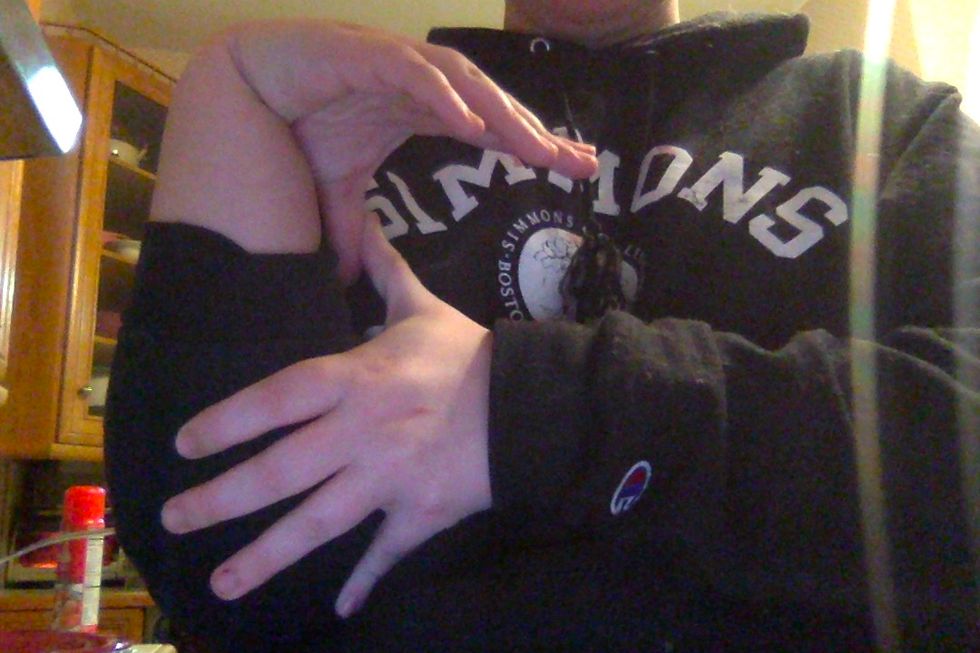This one requires some backstory.
In high school, I always dealt with pain in one way or another. I'd been seeing my doctor for chronic pain since I was twelve. At first, they pinned it on growing pains, until I reached a certain age and stopped growing. Then, I was diagnosed with fibromyalgia, as it seemed to be the only explanation my pediatrician could find. I was 16 then.
Shortly after my 17th birthday, I saw a different doctor in my pediatrician's office because I'd been having swelling in my legs and was worried about it being a more severe issue than I had guessed. It turns out I had completely flattened arches — a sign of the disease he began to prattle off information about. He had me demonstrate various maneuvers with my body, which he soon explained was to asses criteria on the Beighton Scale. I received a score of 8/9 — the only thing I couldn't do was touch my hands flat to the ground without bending my legs.
Long story short, after assessing a few more things, he diagnosed me with a rare connective tissue disorder called Hypermobile Ehler's-Danlos Syndrome (hEDS), previously called Ehler's-Danlos Syndrome Type 3. This genetic condition could affect anywhere from 1 in every 5,000 to 20,000 people, each having varying severity.
Alongside hEDS, I have GERD (gastro-esophageal reflux disease) and another diagnosed gastrointestinal disorder. I have migraine headaches and suspected POTS (postural orthostatic tachycardia syndrome — but that's a mouthful). Standing makes me dizzy, shaky, and on my worst days, makes me faint.
At work in the summer, I coped. I drank double the water of the average human. I spent most of my time at home in bed. In high school, it was easy. I had an elevator pass, and while sometimes my heart got too fast or there were days where my pain was extremely bad, but overall, I made it through.
I was not prepared for college. I wasn't prepared for the way that living in dorms would affect my physical health as well as my mental health, which, as I have learned, directly impact each other. My classes are 8 minutes away from where I live on a good day, 12 minutes on a normal day, and 20 on a bad day. Every morning, at either 8 or 11 am, I walk to class after a night of not-so-restful sleep. Even on nights I sleep 10+ hours, I walk around in a constant haze of fatigue and pain. I can't even drink caffeine without either my heart or my stomach making me suffer.
Naturally, it's not the easiest on my grades. I didn't fail my first semester, but I most certainly did not excel. I do have to make up a class in the spring. Classes are hard when I am mentally asleep for the first half hour of a 50 minute class. It's impossible to do homework when you've walked to and from class, twice, spent 5 hours in class that day, and walked up four flights of stairs, leaving you little energy to do anything but sleep. It's hard having friends and floormates who don't understand why you're always too tired to go out, or why sometimes it's physically impossible for you to go to class, or why yes, you do need to go to the ER right now.
Even I don't understand why my pinkies dislocate brushing my hair, or why sometimes I wake up with my shoulder out of socket, or why sometimes my wrist slips out when I pull up my blanket at night because ow ow ow. It's not fun living with this as a young person, it's not fun having people look at you strange, or tell you it's all in your head, or not believe you because you "look" healthy. But I live with it. Being a young person with a chronic illness is doing the impossible. Healthy people are stressed out and living with poor health due to college, and here we are in poor health, going to college, and succeeding. Mostly. Really, I think that's quite good enough.


















